
views
Landing a Job on Wall Street Right Out of Undergrad

Pick the right major. You may have heard stories about would-be tycoons (like George Soros) who graduated with degrees in philosophy or English and went on to do great things on Wall St. While those stories might be true, they’re the exception to the rule. If you’re set on getting a job on Wall St., you should pick a major that’s most likely to help you succeed, like finance, accounting, or economics. Although finance, business, accounting, and economics are the primary Wall St. majors, some others are becoming more common. Fields of study like engineering, mathematics, and computer science all teach students how to think in a manner consistent with the type of thinking that’s valued in the financial sector.
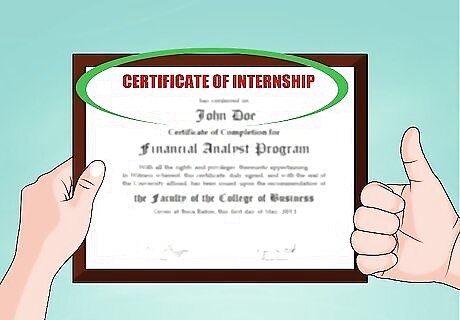
Start reaching out in your junior year. Believe it or not, many positions are already filled by the time of an applicant’s senior year. Most Wall St. firms have internship programs aimed at students in their junior year. Most of the senior-year interns were invited back after the completion of a junior year internship, and almost all of the entry level analyst positions are filled by former senior year interns..
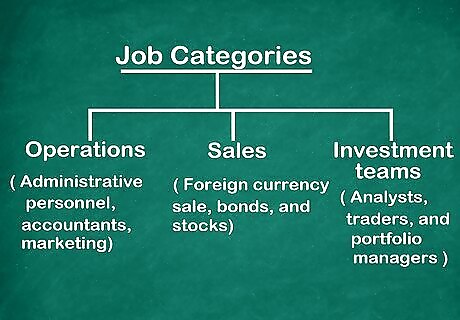
Target a job compatible with your skills and personality. As you might guess, Wall St. firms hire for more than one type of job, and many of those jobs require differing skill sets. In addition, some type of jobs are easier or harder for a recent grad to break into. The three basic job categories are: Operations. Operations describes all of the support functions enabling the firm to conduct its primary business. These could include administrative personnel, accountants, compliance, marketing, and numerous others. These are often some of the easier jobs for a recent grad to obtain, and while they aren’t directly involved with trading or investing, they allow you create networks within the Wall St. community. Sales. Wall St. sales personnel work for investment banks, and are involved in the sale of foreign currency (Forex), bonds, and stocks. They sell to both individuals and institutions such as pension funds, mutual funds, and hedge funds. Sales personnel typically work very long hours, so if you aren’t up for sixty hour weeks, this might not be for you. Investment teams. Investment teams are the analysts, traders, and portfolio managers who work for the “buy side” firms, such as pension, hedge, and mutual funds. These are among the most difficult jobs for a recent grad to obtain, because the accounts are typically the largest.

Make a list of possible targets. Once you’ve decided what type of job you want to land, make a list of target firms. Based on where you want to land, prioritize investment banks or institutional investors. This is not like making a list of target schools, where you have preferred, acceptable, and safety categories. Only about 2% of the applicants for entry level Wall St. positions are hired, so any firm that wants to interview you is a desirable firm. Sort the offers once you’ve got them. For now, just find any firms hiring in your desired specialty.

Reach out to potential firms. Landing an interview is a long and difficult process for most applicants. According to some recent hires, the time commitment required to get an interview is equivalent to a university course. Prepare to be persistent. As you begin your search, reconcile yourself to having many more misses than hits. It isn’t at all uncommon for an applicant to send out 200-300 emails and make dozens of phone calls during their job search, only landing a handful of interviews. Many colleges and universities have career fairs, where recruiters come to campus to try and find young talent. If any of your target firms participate, prioritize these leads. Since calls take longer than emails, call these firms before you move onto any of the others.
Getting a Wall Street Job After Grad School
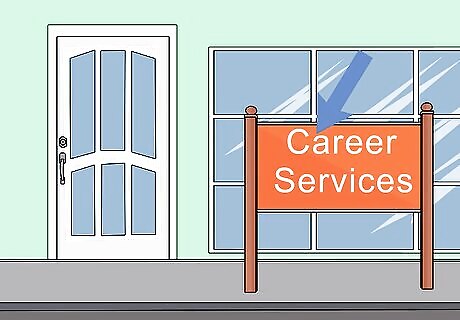
Utilize the career services office. Most graduate schools have more robust career-services offices than undergraduate programs. They will often offer interviewing and resume coaching, networking assistance and tips, and have access to employment listings that aren’t shared with the public. Even if you’ve already graduated, many career services offices will still offer assistance. The better jobs their alumni get, the more it helps the school’s reputation, so it’s in their interest to help you.

Bypass “analyst” positions. In Wall St. firms, analyst positions are entry level positions usually reserved for recent undergraduates with little to no work experience at all. Despite what the job title might lead you to believe, analysts don’t perform much high-level analysis. They complete the drudgery more senior employees don’t want to complete themselves, like proofreading documents, updating files, and gathering data. Precisely because these positions require long hours and lots of drudgery, many firms are leery of hiring an older or more experienced applicant. An employee with experience is more likely to get bored with the work, question orders, and have commitments outside the workplace.

Look for openings for “associates.” In the context of a financial firm, an associate manages a group of analysts. While many associates began as analysts, this is not always the case. Many associates are newly minted MBAs with several years of work experience in a non-analyst capacity. Other acceptable graduate degrees might be in finance or economics. An associate is a mid-level management position, considered a stepping stone to a VP slot.
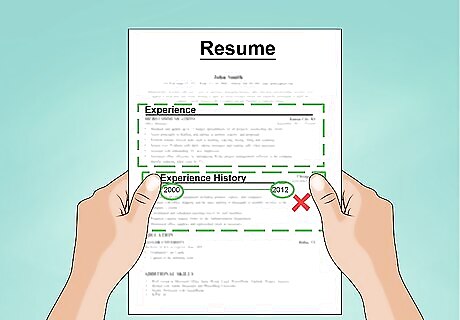
List experience on your resume selectively. Paradoxically, too much experience can harm your job prospects rather than help them. Someone with twenty years’ experience might find themselves constrained by a middle management position; since companies are hiring for the long term, they want to find a person who will be happy in their role. The solution to this problem is to pare down what you list on your resume. Don’t list much more than ten years’ worth of employment history, and confine it to the most relevant positions.
Acing the Interview
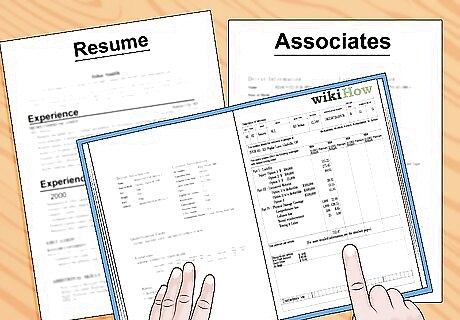
Know your stuff. Jobs on Wall St. are more sought after than ever, and the hiring process has become more rigorous as a result. It’s not uncommon for an interview with a Wall St. firm to last for an entire day, and the interview process entails far more than the interviewer asking you a few questions about your five year plan. You’ll most likely be tested (informally or formally) on a wide variety of subjects germane to the activities of the firm you’re interviewing with. Since 98% of applicants don’t get hired, you need to make sure you know everything you can about how your firm’s sector of the industry operates. These all-day interviews are called “super days,” and you should think of them as more akin to a bar exam than a typical job interview.
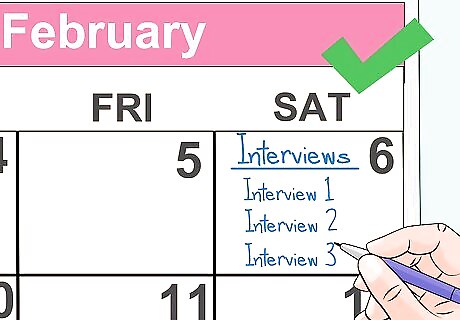
Schedule several interviews at once. Unless you already live in New York City, your interviews with firms are going to require travel. You’ll save money and time if you schedule several interviews over a span of days rather than one at a time. You’ll also cut down on stress. Travelling is an inherently stressful experience, and the less travelling you have to do, the better off you’ll be.

Dress well. While it is possible to overdress for some job interviews, an interview at a Wall St. firm isn’t likely to be one of them. Gentlemen should wear a dark blue or gray suit, white shirt, and a conservative tie. Although ladies have a bit more freedom, they should pick something similarly formal and businesslike.

Come to the interview rested. Super days are a test of endurance as much as a test of knowledge. Employees at Wall St. firms often have to work long hours, and the employers use the interview as an opportunity to see how an applicant will hold up. Take the same kinds of steps you took before you took the SAT—get eight hours of sleep, eat a light breakfast, give yourself enough time to come to the interview alert and rested.

Be confident. Remember, if you’ve gotten to the interview stage, you’ve already made it farther than the vast majority of applicants. The firm you’re interviewing with already likes what they see. If they didn’t you wouldn’t be there. Just allow the qualities that landed you the interview to shine through during the interview.

















Comments
0 comment